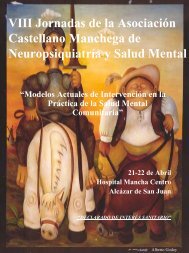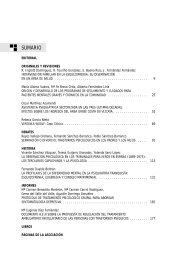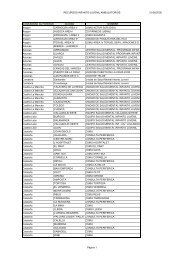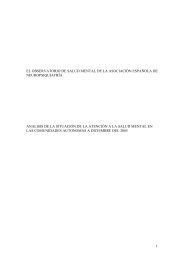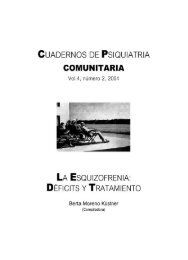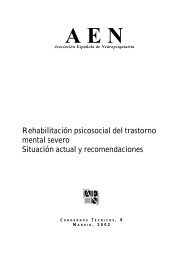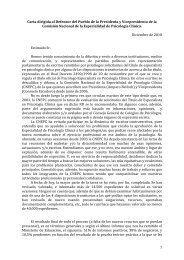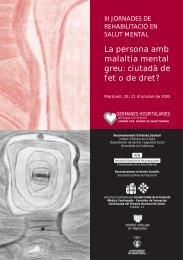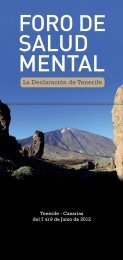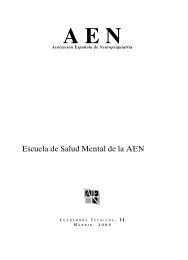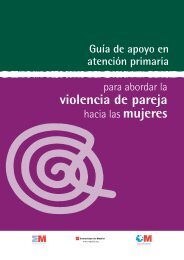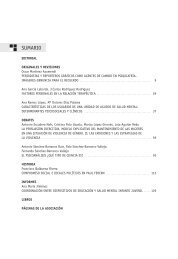Cuad. Psiquiatr. Comunitaria,<strong>Vol</strong>.3, N.º 1, pp. 71 - 81, <strong>2003</strong>Grupos <strong>de</strong> ayuda mutua y asociaciones<strong>de</strong> personas afectadas: reciprocida<strong>de</strong>s,i<strong>de</strong>ntida<strong>de</strong>s y <strong>de</strong>pen<strong>de</strong>nciasJosep Canals SalaAntropólogo.Facultad <strong>de</strong> Pedagogía, E. <strong>de</strong> Trabajo Social.Universidad <strong>de</strong> Barcelona.RESUMENEste artículo analiza los dispositivos asistencialesbasados en la ayuda mutua y en la asociaciónvoluntaria <strong>de</strong> personas afectadas por problemas<strong>de</strong> salud, i<strong>de</strong>ntificando el papel que<strong>de</strong>sempeñan en el actual contexto sociopolítico.Los grupos <strong>de</strong> ayuda mutua y las asociaciones<strong>de</strong> salud son formas asociativas que se sitúanentre la autoatención doméstica y los dispositivossanitarios institucionalizados. Intentan proporcionaralternativas en <strong>de</strong>terminadas problemáticas alas carencias <strong>de</strong> los servicios públicos y a las insuficienciasque manifiesta la autoatención domésticaen el actual contexto social.En el sector constituido por esos grupos y asociacionespresenta importantes confusiones entre diferentesformas organizativas. En el texto se planteadistinguir a las formas asociativas y las funciones querealizan a partir <strong>de</strong> aplicar los conceptos <strong>de</strong> reciprocidady redistribución propuestos por la antropologíaeconómica. La ayuda mutua se toma como factordiacrítico y se <strong>de</strong>fine como una forma <strong>de</strong> reciprocidadhorizontal y simétrica entre personas que compartenla historia <strong>de</strong>l mismo problema y que hace posible re<strong>de</strong>finirautónomamente la situación vivida. Encambio, la mayoría <strong>de</strong> asociaciones <strong>de</strong> salud sesitúan en el ámbito <strong>de</strong> la redistribución, reproduciendolas <strong>de</strong>finiciones y las prácticas <strong>de</strong> intervención <strong>de</strong>los mo<strong>de</strong>los institucionales hegemónicos.Palabras clave: ayuda mutua, asociaciones,reciprocidad, redistribución.ABSTRACTThis article analyzes the resorts of assistancebased on mutual help and the voluntary associationof people affected by health problemsi<strong>de</strong>ntifying what role they play in the currentsocial and political context.Mutual help groups and health associationsare associative figures which are placed betweendomestic self-assistance and institutionalizedhealth dispositives. They try to supply alternativeissues in some problems to publicservices lacks and to insufficiencies of domesticself-assistance in the current social context.The field of mutual help groups and health associationsdisplays important confusions betweendifferent organizative patterns. In this text theauthor tries to discriminate these differentshapes and the functions they perform, applyingconceptual tools on reciprocity and redistributionproposed by economical anthropology. Mutualhelp is taken as the diacritic factor and it is <strong>de</strong>finedas a form of horizontal and symmetrical reciprocitybetween persons which are sharing ahistory of the same problem and that allowsthem to re<strong>de</strong>fine autonomously the situationthey are living. In the other si<strong>de</strong>, the majority ofhealth associations are placed in the field of redistribution,tending to reproduce <strong>de</strong>finitions andpractices of hegemonical institutional mo<strong>de</strong>ls.Key words: mutual help, associations, reciprocity,redistribution.
72Josep Canals SalaINTRODUCCIÓN:IDEALIZACIONES Y CRÍTICASLas asociaciones <strong>de</strong> salud (AS) y losgrupos <strong>de</strong> ayuda mutua (GAM) son entida<strong>de</strong>sformadas por personas afectadas porproblemas <strong>de</strong> salud y/o por familiares <strong>de</strong>estas. Constituyen un sector que ha conseguidouna presencia importante en los últimosaños, <strong>de</strong> tal manera que en estos momentosya no es posible <strong>de</strong>scribir elsistema sanitario sin hacer alguna referenciaal ámbito asociativo. Esta evi<strong>de</strong>ncia esobjeto <strong>de</strong> valoraciones diversas. Entre estastien<strong>de</strong>n a imponerse las opiniones favorables,que muchas veces rayan en la pura ysimple i<strong>de</strong>alización, en coherencia con laelevada estima social que se dispensa a lasONG, al voluntariado y al asociacionismoen general. Esta consi<strong>de</strong>ración social secontrapone a la <strong>de</strong>sconfianza y a la lejaníacon que se tien<strong>de</strong> a percibir todo aquelloque es i<strong>de</strong>ntificado con la esfera <strong>de</strong> lo políticoy con el mundo institucional. La exaltación<strong>de</strong> la sociedad civil es el a<strong>de</strong>rezoi<strong>de</strong>ológico siempre presente en los discursos<strong>de</strong> legitimación <strong>de</strong> las entida<strong>de</strong>s no gubernamentales.Unos discursos que, poruna parte, invocan la mayor eficiencia yagilidad <strong>de</strong> tales entida<strong>de</strong>s y, por otra, presentana las asociaciones y ONG como una"reserva moral" que nos redimiría <strong>de</strong>l individualismoposesivo y competitivo consustanciala nuestro mo<strong>de</strong>lo económico.Ante el discurso apuntado encontramosreticencias y <strong>de</strong>scalificaciones <strong>de</strong> distintosigno: <strong>de</strong>s<strong>de</strong> las críticas <strong>de</strong> carácter políticoque ven en la potenciación <strong>de</strong> las asociacionesy ONG una forma <strong>de</strong> <strong>de</strong>sistimiento<strong>de</strong> sus responsabilida<strong>de</strong>s por parte <strong>de</strong>lEstado, hasta la <strong>de</strong>sconfianza que, en elcampo que aquí interesa, manifiestan algunosprofesionales ante las organizacionesautónomas <strong>de</strong> pacientes y familiares, quepue<strong>de</strong>n ser vistas como grupos <strong>de</strong> riesgo insuficientementecontrolados. Curiosamente,entre los <strong>de</strong>fensores <strong>de</strong> las AS y los GAM,aparecen corrientes contradictorias entre síque coinci<strong>de</strong>n, invirtiéndolas, con laslíneas críticas apuntadas. Para muchos políticosy gestores, esas entida<strong>de</strong>s resultaninteresantes por su economía <strong>de</strong> gestión,basada en su menor burocracia y en unosbajos costes laborales, y por su eficacia,que se atribuye a la introducción <strong>de</strong> la competenciay a su mayor implicación subjetiva.En cambio, para muchas personas afectadasy familiares, y para ciertos sectoresexternos <strong>de</strong> simpatizantes, las AS y especialmentelos GAM, serían alternativas potencialesa la medicalización imperante yun camino hacia la autogestión en salud.En todo caso, ambas posiciones, aparentementeirreconciliables, coinci<strong>de</strong>n en elmismo objetivo <strong>de</strong> crear y <strong>de</strong>sarrollarGAM y AS.Como acostumbra a suce<strong>de</strong>r, la realida<strong>de</strong>s bastante más compleja <strong>de</strong> lo que suelenexpresar las opiniones más difundidas.Aquí trataré sobre la frecuente confusiónentre los GAM y otras formas grupales yasociativas. Utilizaré algunos conceptos <strong>de</strong>la antropología social que permiten construir,en este caso, instrumentos <strong>de</strong> interpretaciónútiles y relativamente sencillos.En este sentido, mi enfoque es complementariorespecto a las aportaciones que, sobreel mismo ámbito, se han hecho <strong>de</strong>s<strong>de</strong> lapsicología social y comunitaria o <strong>de</strong>s<strong>de</strong> lasociología.. 1EL PAPEL DE LOS GAM Y LAS ASLos GAM y las AS son formas asociativasque se sitúan en una posición intermediaentre la autoatención doméstica y losdispositivos sanitarios institucionalizados.Sobre todo los primeros, <strong>de</strong>sarrollanformas horizontales <strong>de</strong> ayuda recíproca,creando un espacio <strong>de</strong> autocuidado y <strong>de</strong> au-




